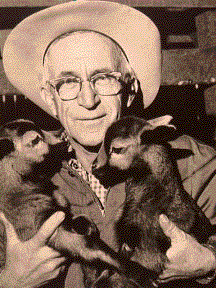 1914-1990
1914-1990
Glenn Spurlock was reared in a livestock family and recognized the importance of disease and parasite control to animal well-being. He attended Chico State, graduating with a BS and then attended the University of California, studying entomology and parasitology at the Berkeley and Davis campuses and earning a PhD in 1941.
Glenn had planned to continue in research, but the loss of his only brother and the shortage of help due to World War II made him decide to return to the family sheep operation in 1942. He worked with his father in the sheep business in Arizona and California from 1942 to 1946, then went into the sheep business on his own from 1946 to 1956 in Williams and later in Dixon.
Still interested in teaching, and with his knowledge of the sheep industry, Glenn was well-prepared to join the Department of Animal Husbandry at UC Davis in 1956. Students were especially appreciative of his wide experience in production and his ability to integrate this with scientific principles.
After a variety of assignments in teaching, Glenn was recruited by Cooperative Extension as a Sheep and Goat Specialist. The Farm Advisors welcomed his assistance in building their programs. He was frequently involved at the Hopland Field Station as well as in the counties. His contributions to the sheep industry were recognized by his receipt of the Order of the Golden Fleece from the California Wool Growers Association in 1969.
Glenn continued his small personal farm flock until his retirement in 1975. He was willing to test some of his ideas there before suggesting them to producers. An example was his work with the Barbados blackbelly hair sheep which are popular with small flock owners and are receiving increasing attention in developing countries.
Upon retirement, Glenn and his wife, Doris, moved to Gualala in Mendocino County to raise trees instead of sheep. He combined his talents and experience to enrich those who knew him. Not only did he share his exceptionally broad knowledge of livestock production with many people, but also his avocational interests in such areas as poetry and local history.
